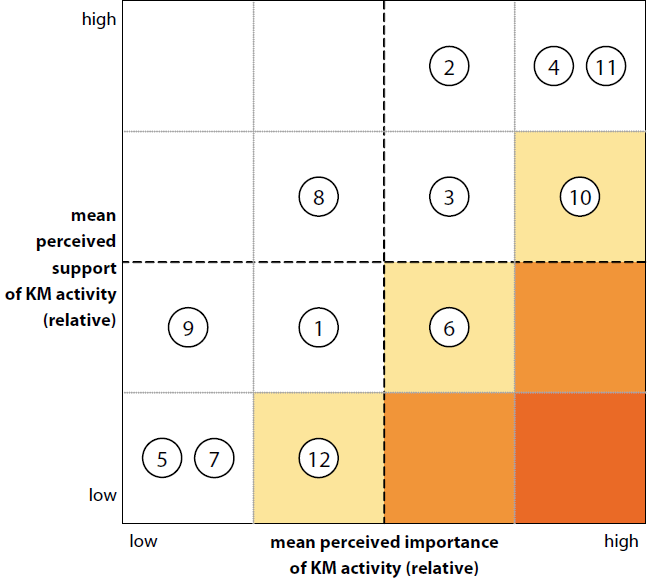Contributing to Knowledge Maturing: Knowledge Maturing Activities
The attempt to pack and articulate organizational Knowledge Maturing Activities (KMA) in context of creating learning rich workplaces led to a study crossing theoretical definition as well as practical validation. The performance of activities identified contribute to the development of knowledge on a collective level, where usually the goal-oriented learning of individuals involved goes way beyond in its effects.
The concept of activity proves to be beneficial to analyse knowledge maturing where the perspective of practice finds its roots in knowledge work in different professions, positions and industries. Practices formed by individuals or teams are characterised by knowledge work comprising activities of acquisition, creation, collection, organization, maintenance, systemization, communication and application of knowledge. Primarily, the exploration and joint creation of knowledge is operationalized as strategic focus and applied to all business processes. It is for KMAs to facilitate communication, function as mediation or as cognitive support, making use of artefacts, cognifacts and sociofacts (see section 2) as well as producing such for business progress.
In preparation to the empirical study on deriving an agreed list of KMA occurring across the whole of knowledge maturing processes, the profound theoretical investigation was supplemented by an ethnographically-informed study to match elaborated KMA to real-world maturing practices and activities. The scope of organisations investigated widened the picture of perception by underlying companies of different size, sector and knowledge intensity. What resulted was a comprehensive and practically corresponding list of twelve KMAs, discussed and formulated on grounds of deep understanding of activities performed by knowledge workers and used as interview guideline to the empirical study.
| 1 | Find relevant digital resources | Search for information, e.g. documents, web pages or images. |
2 | Embed information at individual or organisational level | Include the information into one’s own knowledge base, which could be a (personal or shared) file system, a (personal/team/corporate) wiki, or similar. |
3 | Keep up-to-date with organisation-related knowledge | making sure that oneself or another person stays up-to-date regarding a certain topic |
4 | Familiarise oneself with new information | Making oneself familiar with e.g. a topic or a community or processes |
5 | Reorganise information at individual or organisational level | Restructure collections (file systems, wikis, …), consolidate different approaches to collective structuring, removing outdated items, improving findability through assigning metadata, “gardening” of wikis, vocabularies etc., rearrange contents or files, clean-up work spaces and assure quality of a collection of digital resources |
6 | Reflect on and refine work practices or processes | This reflects process maturing from discovery of task or process patterns, the analysis thereof to improving practices and/or processes. The knowledge maturing activity thus comprises practices (i.e. not formally specified), procedures (informal or endorsed) as well as processes (specified, defined) |
7 | Create and co-develop digital resources | Generate new or update existing contents by oneself or together with others. |
8 | Share and release digital resources | Share denotes the informal, release the formal or official part of granting access to contents for a specified or unspecified group of people. |
9 | Restrict access and protect digital resources | Restricting access to contents. |
10 | Find people with particular knowledge or expertise | identify a contact person, e.g. by skills |
11 | Communicate with people | interact with others, e.g. face-to-face, by phone, by mail |
12 | Assess, verify and rate information | Evaluate contents with respect to certain quality criteria like accurateness, up-to-dateness, usefulness or people with respect to their capacities or behaviour |
Empirical results
As part of a large-scale interview study, the listed KMAs were investigated with respect to three concepts: “perceived importance”, “perceived support” and “perceived success”. 139 interviewees were asked to reflect on how important they think that the KMAs were for increasing maturity of knowledge in the organisation they represent, how far organisational or ICT instruments contribute to these knowledge maturing activities and finally, the interviewees were asked to state on how successfully they believe these KMAs are performed in their organisation. Besides rating on each proposed KMA, the respondents were asked to provide further KMAs performed in their organisation (see section REF _Ref326586411 \r \h 3.3
The results brought up relatively high mean values to all three concepts, having the interviewees predominantly agree with the worked out KMAs under the presented aspects.
Considering the design of software and services to support KM, the most interesting KM activities are those which are viewed as important for increasing knowledge maturity, but for which interviewees have the impression that they are not well supported. According to the portfolio, the following activities are most interesting to KM by interviewees:
- reflect on and refine work practices or processes
- find people with particular knowledge or expertise
- assess, verify and rate information
